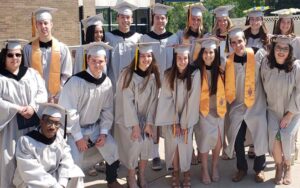
Graduates from Gloucester County Institute of Technology who earned their associate degree from Rowan College South Jersey.
This article originally appeared June 29, 2020 in ROI-NJ.com.
Blaine Edlefsen had a lot to keep track of during his last two years of high school in Jefferson Township.
In addition to all of his regular high school courses, he spent half of each day in the engineering design and advanced manufacturing, or EDAM, program at the Morris County School of Technology as well as taking extra classes at the County College of Morris.
“I averaged six to seven days a week, from five to 10 hours a day,” said Edlefsen, 18. “The time was filled completing homework assignments, projects and studying for exams. It has been exhausting, but a wonderful experience. I have learned a lot about myself, that I am stronger and more capable than I originally felt.”
All that hard work paid off this spring, when he received his associate degree from the County College of Morris along with his high school diploma. He’s headed to the New Jersey Institute of Technology in the fall, where he plans to study mechanical engineering technology. He already knows he wants to pursue a master’s degree in engineering science.
“I felt it would be a great opportunity for me to expedite my undergraduate degree and save money,” Edlefsen said. “My senior year, I was encouraged to not only continue in the EDAM program, but to obtain an associate degree in engineering. The dual program was demanding and offered me the opportunity to challenge myself.”
Edlefsen is one of 161 vocational-technical high school graduates in New Jersey who simultaneously earned an associate degree. It’s the largest group to date since county vocational-technical schools began offering dual-credit options that enable students to take college-level courses as part of career and technical education programs at their high schools.
The students are from vocational-technical schools in Atlantic, Bergen, Cumberland, Gloucester, Hudson, Morris, Salem and Somerset counties. Dual-credit programs are now widely available to students in many different career programs, including manufacturing technology, health sciences, engineering, culinary arts and computer science.
For students who pursue the opportunity to earn an associate degree while finishing high school, the payoff is big — a two-year head start on college and their career as well as saving tens of thousands of dollars on tuition. In addition, the chance to try out college early gives students a clear sense of their academic and career focus when they matriculate full time.
“Career and technical education is designed to provide clear pathways to college and career, and more than 10,000 county vocational-technical high school students take college-level classes each year,” said Judy Savage, executive director of the New Jersey Council of County Vocational-Technical Schools. “But these students who have translated that opportunity into a two-year college degree while finishing high school are extraordinary.”
The federal Carl D. Perkins Career and Technical Education Act requires career and technical education programs to include postsecondary articulation agreements that enable high school students to simultaneously earn high school and college credits.
Each of the state’s 21 county vocational-technical schools has multiple articulation agreements with their county college, and other two- and four-year colleges and universities, that enable students to earn credit for college-level work as part of their high school career and technical education program.
However, several have taken it a step further, with agreements that give high school students the opportunity to complete an associate degree. And, in other counties, it is students like Edlefsen who have doubled down on available college courses to complete two-year college degrees before donning their high school cap and gown.
“New Jersey’s community colleges enjoy a special relationship with New Jersey’s county vocational technical schools, working in collaboration to prepare students for careers in the innovation economy,” said Aaron R. Fichtner, president of the New Jersey Council of County Colleges.
“These 161 graduates represent the best of what our relationship can deliver,” Fichtner said. “We are committed to these dual enrollment programs to allow for affordable pathways to post-secondary education and efficient entry into the workforce.”
These opportunities vary by county, with some classes taught by high school teachers who have been approved by colleges to teach postsecondary courses, and others taught by faculty on the community college campus. At some vocational schools, students start taking college courses as early as their freshman year, but nearly all spend most, if not all, of their senior year on a college campus.
“Dual-credit programs enable students to begin learning about the college environment early, which assists in giving them confidence and build learning strategies to assist them better when they leave high school,” said Christine Datz, the director of student personnel services at Gloucester County Institute of Technology, which had 16 students graduate with associate degrees from Rowan College of South Jersey.
“It is a great learning tool for them, while still having the support of a high school environment to fall back on,” Datz said.
Hailey Sulzbach, 17, who is graduating from Gloucester County Institute of Technology, received her associate degree from Rowan College of South Jersey with a degree in health sciences. She is planning to study molecular biology at Princeton University in the fall. She hopes to go to medical school and one day become a surgeon.
Peter Esset, 18, of Atlantic City, is graduating from the Aviation Academy at Atlantic County Institute of Technology and earned his associate degree in aviation studies from Atlantic Cape Community College. He plans to attend one more semester at ACCC before transferring to NJIT to study mechanical engineering.
Esset, who was born in Nigeria, moved to the United States in 2012 when he was in fourth grade. He said getting his associate degree was a struggle that was worth the effort.
“No one on both sides of my family has made it as far as I have at this moment,” Esset said. “I recently lost my grandmother on Mother’s Day, I was hoping she would still be here to see how far I will get, but nonetheless it just gives me more fuel.”



